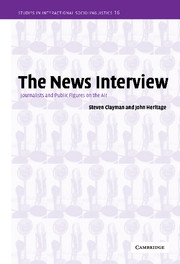Book contents
- Frontmatter
- Contents
- Acknowledgments
- 1 Introduction
- 2 The news interview in context: institutional background and historical development
- 3 Openings and closings
- 4 Basic ground rules: taking turns and “doing” news interview talk
- 5 Defensible questioning: neutralism, credibility, legitimacy
- 6 Adversarial questioning: setting agendas and exerting pressure
- 7 Answers and evasions
- 8 The panel interview: discussion and debate among interviewees
- 9 Conclusion
- Appendix: transcript symbols
- References
- Subject index
- Index of names
9 - Conclusion
Published online by Cambridge University Press: 23 November 2009
- Frontmatter
- Contents
- Acknowledgments
- 1 Introduction
- 2 The news interview in context: institutional background and historical development
- 3 Openings and closings
- 4 Basic ground rules: taking turns and “doing” news interview talk
- 5 Defensible questioning: neutralism, credibility, legitimacy
- 6 Adversarial questioning: setting agendas and exerting pressure
- 7 Answers and evasions
- 8 The panel interview: discussion and debate among interviewees
- 9 Conclusion
- Appendix: transcript symbols
- References
- Subject index
- Index of names
Summary
Over the course of this book, we have examined a number of fundamental practices through which interaction in the modern news interview is conducted. These practices are shaped by the basic institutional conditions of broadcast journalism in Western democracies, and they constitute a set of ground rules that effectively define the playing field within which, sometimes cooperatively and sometimes competitively, journalists and public figures make the news.
Our description and analyses of these practices have drawn extensively from both American and British news interviews. This reflects our conclusion that there are no fundamental differences between the two countries in the overall palette of practices through which news interviews are realized. As we have suggested, though there are important differences in the methods by which broadcast journalism is legally regulated in the two countries, there are no significant differences in the basic institutional constraints which shape the news interview. In both countries, there is a need to balance objectivity with adversarialness in the news interview context. And most of the practices we have examined connected with turn-taking, neutralism, question design, the management of answers, and debate interviews represent systematic solutions to the practical management of this balance. Thus a mix of legal regulation, economic pressures, and the mutual needs (and sanctions) of journalists and public figures have combined to create a remarkably similar “fingerprint” of basic communication practices in the broadcast interview in both countries.
- Type
- Chapter
- Information
- The News InterviewJournalists and Public Figures on the Air, pp. 337 - 346Publisher: Cambridge University PressPrint publication year: 2002

